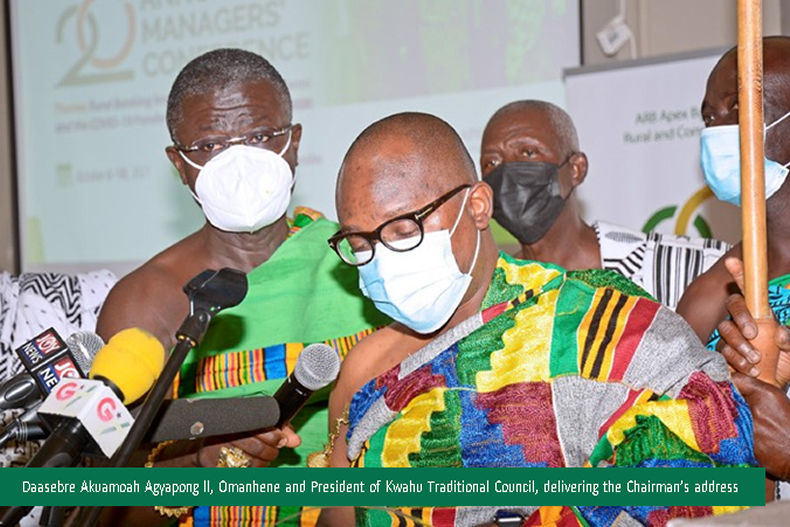Reduce Corporate Income Tax For Rural Banks - Kwahumanhene pleads

The Omanhene and President of Kwahu Traditional Council, Daasebre Akuamoah Agyapong II, has urged the Government to seriously consider reducing the corporate income tax paid by Rural and Community Banks (RCBs) in the country from the current 25% to 15%.
Daasebre Akuamoah Agyapong II said a reduction in the corporate income tax for the RCBs would be a major boost for the rural banking industry in the country since it would allow the banks to plough back some of the profits into more rural community development projects.
Speaking at the 20th Annual National Chief Executive Officers’ (CEOs) Conference of RCBs (RCBs) and ARB Apex Bank PLC at Nkwatia – Kwahu in the Eastern Region, he said, he was adding his “Royal voice and the endorsement of Nananom to the humble plea by the RCBs for the Government through the Bank of Ghana and the Ministry of Finance to consider reviewing the corporate income tax downwards to allow the RCBs to invest into more rural and community development projects.”
He said he was aware that several representations have already been made by the rural banks to Government on the high corporate income tax, adding that Government should consider the appeal for a downward review expeditiously.
The three-day CEO’s conference, which was on the theme: “Rural banking beyond financial sector reforms and the COVID-19 pandemic”, attracted over 218 participants out of which 122 were CEOs of RCBs. Others included key officials from the Bank of Ghana, ARB Apex Bank PLC, and the Association of Rural Banks, Ghana.
The conference was held at the plush Rock City Hotel at Nkwatia on the Kwahu Ridge in the Eastern Region from October 6 to 9, 2021.
Rural banks must up their game
Daasebre Akuamoah Agyapong II revealed that the mandate of traditional rulers “is to ensure sustainable development and progress of our communities, to provide improved livelihoods for our people. This, we do by tapping into all available resources and partnering with development-oriented organizations such as the RCBs to bring the needed development, because government alone cannot marshal the resources for sustainable and equitable development of the countryside.”
He therefore pleaded with the RCBs “to develop products and services specifically targeted at the micro-small- and-medium enterprises, operating in the rural areas."
He tasked the rural banks to “move fast and integrate Financial Technology (Fintech) tools for the delivery of banking solutions to rural folks.”
Daasebre Akuamoah Agyapong II stated that Telecommunications and Fintech firms have become direct competitors to the rural banks, “which calls for creativity and speed on the part of banks to develop and deploy products that would bring ‘double delight’, and comfort to their customers.”
“If the customers are sure that they can enjoy improved traditional products as well as technology-enhanced services from the RCBs, they would remain loyal to the banks,” he stressed. He also called on the rural banks to “deepen their community development programmes, which he stated was “important because the communities in which you operate would not remember you for the annual profits you declare but rather for the life changing corporate social responsibility (CSR) programmes you undertake.”
Corporate Governance Directives kick in first quarter 2022
Mr Yaw Sapong, Head of Other Financial Institutions Supervision Department (OFISD) at the Bank of Ghana stated that “good corporate governance and prudent risk management remain key for the industry.”
He said it was to address the protracted gaps within the rural banking sector that the BoG “has issued the Corporate Governance Directives and Risk Management Guidelines for rural and community banks.”
Mr Sapong stressed that “the effective date for the implementation of all sections of the Corporate Governance Directives is March 31, 2022 and I entreat Management of rural banks to apprise themselves of the Directive to ensure full compliance with relevant provisions.”
Mr Sapong revealed that the new “Corporate Governance Directives seek to establish sound corporate governance and risk management principles for efficient operations within the rural banking sector.
The Directives are also expected to advance governance systems to create a conducive environment for the rural banking community to serve the best interest of depositors and other stakeholders, and enhance overall corporate perf ormanc e , accountability, and public trust.”
In addition, he said, “the Risk Management Guidelines seek to provide a comprehensive risk management framework that will enable RCBs to pursue sound risk management practices in their operations.”
BoG introduces E-Cedi
Mr Sapong noted that just like other developed economy central banks, the BoG was piloting its Central Banking Digital Currency (CBDC) and would soon introduce the E-Cedi.
“The Bank of Ghana is in the pilot phase for the E-Cedi. Ghana’s CBDC will trigger new financial products and services and quicken the pace of financial inclusion in the country. At each stage of the process, the Bank will collaborate with all stakeholders, including the ARB Apex Bank to leverage on the available opportunities within the digital payment ecosystem,” Mr Sapong added.
Banking sector remains resilient
Mr Sapong noted that “the banking sector has remained strong and well- capitalized, with stronger growth in total assets, investments and deposits.”
“The Bank of Ghana’s latest stress tests show that banks were still resilient under mild to moderate stress conditions supported by the strong capital and liquidity buffers and the regulatory reliefs introduced during the pandemic,” Mr Sapong said.
He added that “the Specialized Deposit-Taking Institutions (SDIs) and Non-Bank sub-sec t or s continued to reflect gains after the clean-up process.”
Mr Sapong said “in July 2021, the balance sheet of the RCBs, Savings and Loans, Finance Houses, and MicroFinance In s tit utio ns improved. This was driven by a strong growth of 27.0 percent in deposits relative to 15.7 percent growth in July 2020, and gross advances also increased by 17.3 percent compared with a contraction of 19.3 percent over the same c ompar a tiv e period.”
Acting MD upbeat
Addressing the conference, Mr Alex Kwasi Awuah, Acting Managing Director of ARB Apex Bank PLC revealed that “a significant portion of the investments with the Securities and Exchange Commission (SEC) regulated institutions remain unpaid, and this could create some operational challenges to the RCBs if not addressed.”
Mr Awuah noted that “at the outset of the reforms, total amount of funds invested in the Companies in the books of the RCBs amounted to GH¢725.04 million. Out of this amount, GH¢648.99 million (89.5%) has been validated. Total payments received, both cash and bonds issued as at end August 2021 amounted to GH¢190.62 million.”
Hence “an amount of GH¢457.86 million which constitutes 71% of the validated investments is still locked up with the investment companies. In all, ninety- two (92) banks have been affected in varying degrees of adverse impacts.”
Despite these, Mr Awuah revealed that “through the support of the ARB Apex Bank PLC, the rural banking industry has successfully managed its liquidity needs and our customers continue to have confidence in our banks”, adding that “total deposits have been on the growth trajectory and we are happy to say that we recorded an average annual growth of 24% from GH¢2.85 billion at the end of December 2017 to GH¢5.32 billion at the end of December 2020. Deposits also grew further to GH¢5.70 billion at the end of June 2021.”
He appealed to Dr Ernest Addison, Governor of the BoG “to use his good office to help us retrieve the remaining locked up funds with the SEC-regulated firms. We believe that this would boost our operations and enable us give maximum credit lending support to many micro, small and medium enterprises across the country.”
Mr Awuah stated that “on our part, we wish to state that the ARB Apex Bank PLC has subsequently issued Investment Guidelines to the RCBs and began training the banks on taking prudent investment decisions. We entreat all General Managers and Chief Executive Officers to use the document as a guide in taking investment decisions.”
Innovations to conference organization
Mr Awuah revealed that “to make this year’s Conference more participatory, the Planners have extensively consulted the RCB Managers’ group. Therefore, the selection of the theme, conference venue, date, programme content, and every other aspect of the Conference package was discussed and we are grateful to them for their guidance and inputs.”
He said the main working sessions of the Conference were increased from the previous two days to three days, “to allow us to fully exhaust all the major items on the programme.”
“This is our major strategy session and I believe that we shall do well to meet every participant’s expectation,” he said.
Mr Awuah added that “as a demonstration of the commitment of ARB Apex Bank PLC to growing a rich pool of competent ladies across the RCB industry to assume managerial roles in the various banks, this year’s Conference built in a special package for more than 30 ladies selected from RCBs to be part of the Conference.”
“It is our expectation that more opportunities would be created for a good number of our ladies to be appointed to senior management positions in our banks. I urge the ladies who are privileged to partake in this Conference to endeavour to derive the maximum benefits from the programme,” Mr Awuah stressed.
Association of Rural Banks
Mrs Comfort Owusu, Executive Director of the National Association of Rural Banks, Ghana stressed the need to reposition the rural banking brand to attract the youthful, upwardly mobile population who, hitherto, avoid the rural banks.
She said “there is the need to reposition the rural banking brand as vibrant, reliable and resilient in order to attract non-users such as the youth, the upper middle class, customers of the defunct institutions and many more.”
Mrs Owusu added that “the repositioning ties in with the Bank of Ghana’s agenda to rebrand the sector to support rural economic development.”
She said “the Association of Rural Banks intends to develop and implement effective brand and marketing communication strategies so that the banking public will appreciate what the brand stands for in terms of our point of differentiation.”
“This will no doubt augment the efforts put forth by the ARB Apex Bank PLC. In order to avert any communication gap that is likely to dilute the brand, we urge all RCBs to work hard to improve their internal systems and operations especially in the area of service quality,” she added.
On his part, Seth Adom-Asomaning (Esq.), Eastern Chapter President of the Association of Rural banks stated that “as digital banking has become an integral part of the banking ecosystem, RCBs need to develop comprehensive and stringent risk management processes, policies and procedures to strengthen their existing customer acceptance policy.”
These he said, “Would mitigate the onboarding of persons who would seek to use the banks to further their fraudulent intentions such as money laundering, terrorist financing and credit fraud.”
Other Conference speakers
Other speakers at the conference included, Mr Ignatius Cobbina, Agency Banking Consultant, who spoke on the topic: “Transitioning from brick and mortar to alternative channel delivery”, Mr Kwesi Korboe, who spoke on the topic: “Ghana Incentive Based Risk- Sharing System for Agricultural Lending (GIRSAL)”, Mr Yaw Oppong and his Team from RDF Ghana, and Mrs Emefa Agonyo of the Public Affairs Department at the Social Security and National Insurance Trust (SSNIT), who took the CEOs through how to prepare for pension.
The Annual National CEOs’ Conference of Rural and Community Banks and ARB Apex Bank PLC is the main strategy session of the key players in the rural banking ecosystem. It brings together the cream of decision makers in the sector to strategize on how to effectively run the sector. It has been held consistently every year for two decades.

|

|



